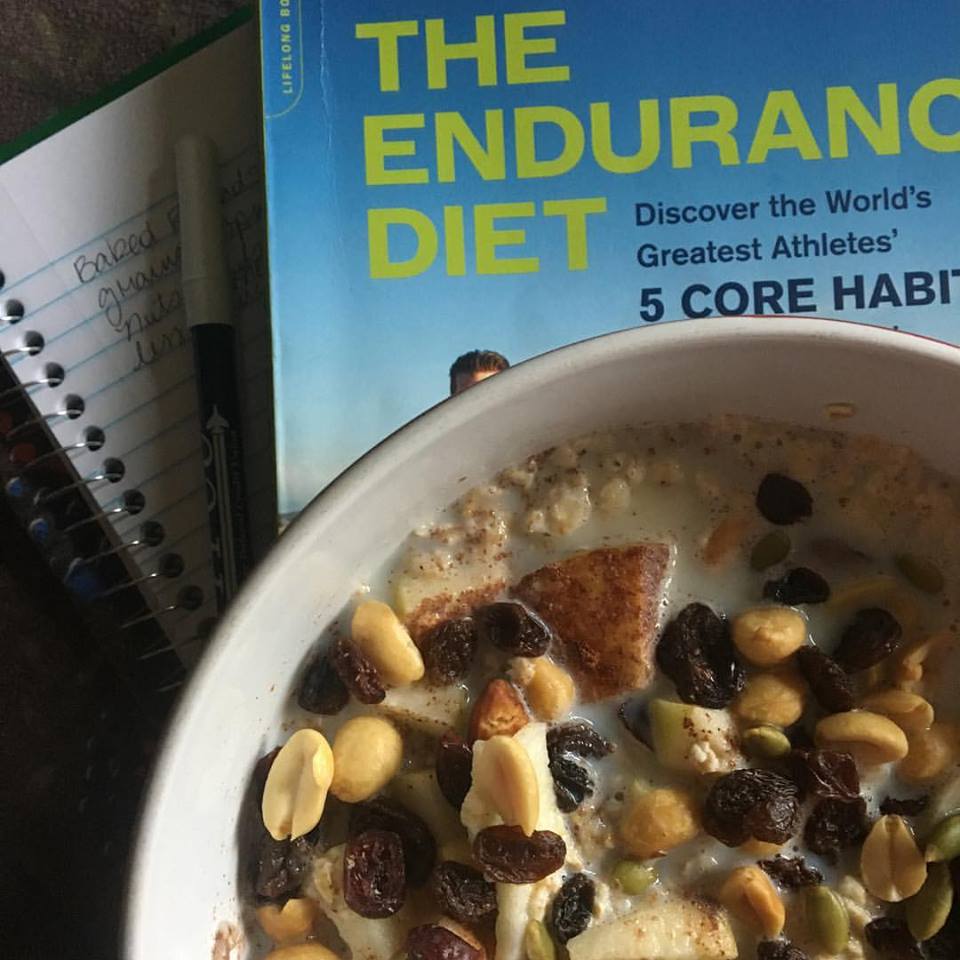Hey friends, happy Motivation/ Marathon Monday! This week I have an on-topic book for you to consider: The Endurance Diet by Matt Fitzgerald.
I’ve been lauding it on Facebook and Instagram for a few weeks, and my husband and friends have endured (get it?) my overflowing commentary since reading it. Thought it was time to begin laying out my thoughts.
Whether you are…
- a long distance runner or other type of endurance athlete,
- a curious exerciser who wants to finally figure out the nutrition part of the wellness puzzle,
- an exhausted dieter who is pretty much DONE with diet culture,
- or someone who lives with and loves such a person,
…you have a lot to gain from reading this slim book.

First, let’s clarify that despite its title this book is not really a “diet book,” not in the traditional trendy fad/ quick weight loss/ make some money and sell some protein shakes kind of way. It’s all science and anthropology. Just a smart collection and analysis of best practices, eating habits that have coincidentally been working well for the world’s most successful endurance athletes. The author is a professional running coach and sports nutritionist and early on takes great pains to explain his research process. I groove this.
I stumbled onto The Endurance Diet by accident. During those weeks I was injured and taking a frustrated break from running, I listened to a podcast about dealing with and preventing injuries like mine, and the author happened to be the guest that day. He and the host just grabbed my attention. They dovetailed into a conversation about eating well to support the hard work of training, and how the elites do it all. I listened raptly, took notes between ironing my husband’s shirts, and once the book was mentioned, excitedly ordered it. Paperback, so I could write notes in it, because Know thyself, right? Ha.
As soon as the book arrived in our turquoise mailbox I cracked it open and could scarcely put it down until the final page. It was a pleasant, head-nodding read, largely I think because of the variety in each chapter. Fitzgerald mixes an array of instruction and bullet points, scientific explanation, personal anecdotes, and case studies about actual endurance athletes from all around the globe. That last part was so much fun. I got a big kick out of learning little bits abut other cultures’ food options, morning drink rituals, native grains and farming traditions, etcetera. Fascinating stuff. As I read the stories about other people’s experiences (injury and recovery, weight gain and how they fixed it, depletion versus vitality), deep thoughts and life lessons started clicking into place. I actually looked back at my old running journals and saw lots of similar observations. I noticed familiar lines about how certain modes of eating and exercising had made me feel and perform, both the good and the bad. It was all highly relatable.

This is a point worth stressing: The fact that a below-average exerciser like me can glean the same wisdom offered to elite competitors is cool. Fitzgerald writes repeatedly that what is good for the highest level athlete is also good for most people’s general health and well being. These are not extreme-condition pieces of advice. I love that.
One of the most valuable themes throughout The Endurance Diet is the gentle pressing of a positive food ethos. The inside-out importance of seeing food as not only fuel (of course it is) but also pleasure and a means of connection (of course it is!). The key ingredient, he teaches, is trusting your own body and its complex regulating systems, which, once healed from misuse, will always be more reliable than any external plan or set of rules.
This articulation has been a long time coming for me. I don’t think I have had an eating disorder, not truly, but I have for years tortured my mind and body with negative thinking and unsustainable rules. If this book has had a single measurable benefit for me, it could simply be escape from calorie counting once and for all. I’ll keep you posted.
So. I am not pushing a “diet to lose weight” book onto my friends. Pinky promise. I am suggesting a book aimed at relearning the power of natural nutrition for endurance sports and the amazing (almost magical) ways our own bodies can regulate and heal themselves. I’m really excited to have found a simpler way to view this part of the big wellness puzzle and am hopeful that I can take another stab at long distance running without making those weird mistakes I made in 2015.
Okay. If you’re still with me, here are some specific takeaways:
The book offers habits, not rules, and just 5 of them:
- Eat everything.
- Eat quality.
- Eat carb-centered.
- Eat enough.
- Eat individually.
The book reinforces the myriad benefits of a good cardiovascular exercise program, whether you are a competitive athlete, an “age-grouper,” or a health-conscious human being:
- reduces body fat levels
- strengthens the heart
- improves circulation
- helps the body absorb and adapt to stress
- improves metabolic efficiency
- sharpens the nervous system
- boosts muscular fatigue resistance
The book identifies “endurance super foods,” though the author balks at such labels. The list of 22 items was accessible, too, plus affordable. I feel so grateful to naturally crave good-for-you nourishment! Seventeen of the foods already make constant rotation here in our kitchen, and only one of these 22 foods was foreign to me, Teff.
- almonds
- bananas
- beets
- black beans
- brown rice
- cherries
- coffee
- corn
- eggs
- garlic
- olive oil
- peanut butter
- potatoes
- red wine
- salmon (or lox)
- spinach
- sweet potatoes
- tea
- Teff
- tomatoes
- tuna
- yogurt
Every part of the book makes a big deal out of individualizing your plan, listening to your own body daily, and honoring your actual daily needs, personal chemistry, happiness, and health above and beyond any external motivations. This is huge. I appreciate this so much, as it is something my husband and I (and recently some good friends) had already been discussing for months.
I mentioned the exciting possibility that this book may have nudged me once and for all away from calorie-counting. What the author offers as a stand-in might be of interest to you, though I actually feel relaxed and informed enough now to move forward without it: Fitzgerald separates foods into “high-quality” and “low-quality” and then into sub-categories for each. From there he offers a scoring system that helps you evaluate your daily eats then zero in on ways to make smart substitutions. He sells a phone app, if you’re interested, too. Each food group is worth up to 2 points depending on how often you eat it that day, and the maximum score is something like 28.
High-quality Foods:
- Vegetables
- Fruits
- Nuts, seeds, & oils
- Unprocessed meats & seafood
- Whole grains
- Dairy
Low-Quality Foods, largely made popular during the Industrial Era:
- Refined grains
- Sweets
- Processed meats
- Fried foods

(You know, if I continue sharing all of my many notes, this review will end up being longer than the book itself. Ha.)
If you are a long-distance runner, swimmer, or cyclist and this topic is interesting to you, I highly encourage you to read this book. A lot of the content seems like common sense, and Fitzgerald himself admits that; but it is gathered in a compelling way and is supported by all kinds of satisfying explanation.
I feel so refreshed to understand now precisely why certain efforts have failed. I feel excited to test out less dieting and more intuitive eating. Motivated to view my food as absorption for challenging workouts.
I will check back in after a month or so of this effort and let you know how I feel. In the midst of it all I am training for a trail half marathon, too, so I am really happy about the prospect of feeling great during these coming weeks. (Upcoming post on injury recovery and some little things that have helped!)
Gotta go. Thanks so much for sticking it out through a super long book review! If you read The Endurance Diet, let me know what you think!
“…but in the real world, the healthiest and fittest people,
including elite endurance athletes, follow a few basic rules of eating
and let the details take care of themselves.”
~Matt Fitzgerald
XOXOXOXO
I hadn’t heard of Teff, either, but read about it and can’t wait to try it. Thanks!